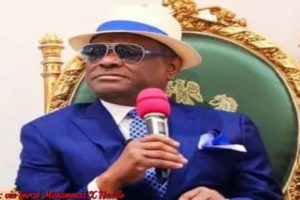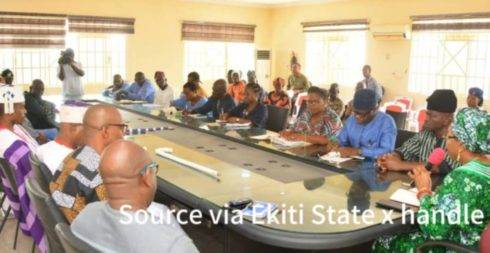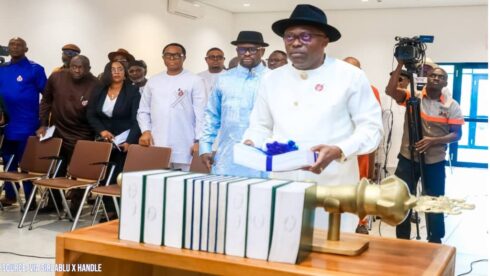Amid escalating tensions surrounding the selection of a new Alararomi of Araromi Ekiti, the Ekiti State Government convened a crucial meeting with key stakeholders to address the brewing crisis. The dispute, centered on the emergence of Prince Adebomi Babalola as the Alararomi-elect, had sparked unrest among contenders and interested parties, casting a shadow over the selection process.
During the deliberations, held at the office of the Deputy Governor Ekiti State, Chief (Mrs) Monisade Afuye, the government clarified its impartial stance, affirming that it had no vested interest in any particular candidate. Rather, it endorsed the selection and nomination made by the relevant ruling House and kingmakers following an Ifa consultation.
Mrs Afuye reiterated the Ekiti State government’s unwavering commitment to equity, fairness, and transparency in all matters related to chieftaincy across the state. She dispelled accusations of nepotism leveled against the administration, urging stakeholders to trust in the integrity of the process and the Ekiti State government’s dedication to upholding the Alararomi Chieftaincy Declaration.
Furthermore, the Deputy Governor emphasized the need for unity and reconciliation among the Araromi indigenes, contenders, and other stakeholders. She urged all parties to view the selection process as a platform for fostering cohesion and solidarity within the community, rather than a divisive competition.
Call for Restraint and Harmony
In light of the tense atmosphere pervading the community, Mrs Afuye implored those inclined towards incendiary rhetoric to exercise restraint and refrain from inflaming passions further. Stressing the importance of peaceful coexistence, she urged all stakeholders to prioritize dialogue and reconciliation in resolving differences.
To substantiate the transparency of the selection process, stakeholders were presented with a video recording capturing the Ifa consultation, underscoring the adherence to established protocols and procedures.
Among the dignitaries present at the parley were Commissioner for Chieftaincy Affairs and Home Affairs, Hon. Ojo Atibioke, Commissioner for Information, Rt. Hon Taiwo Olatunbosun, Chairman of Ijero Local Government, Hon Abayomi Folowosele, as well as senior officials from the Deputy Governor’s Office and the Chieftaincy and Home Affairs department.
Traditional rulers, including the Paramount ruler and Ajero of Ijero Ekiti, Oba Joseph Adewole, alongside other esteemed leaders such as the Elepe of Epe Ekiti, Oba Ayodeji Adesoye, the Alara of Ara Ekiti, Oba Emmanuel Adedara, and the Regent of Araromi Ekiti, Princess Funmilayo Adesina, also graced the occasion.
The convergence of these influential figures underscores the collective resolve to promote peace, stability, and unity within the Araromi Ekiti community, signaling a positive step towards the resolution of the protracted Obaship tussle.
Implications of Ekiti State Government Mediates on Araromi Obaship Dispute
The Ekiti State Government has taken proactive steps to address the longstanding obaship tussle in Araromi Ekiti, a move aimed at dispelling rumors and fostering peace within the community. The initiative, spearheaded by the Ekiti state government, reflects a commitment to dialogue and conflict resolution, signaling a significant shift towards restoring tranquility in the region. This development has been widely welcomed by residents and indigenes of Araromi Ekiti, who have long yearned for a resolution to the contentious issue.
The decision to convene all warring parties at the negotiating table underscores the government’s recognition of the pivotal role that peace plays in fostering genuine development, both economically and politically. By prioritizing dialogue over confrontation, the state government has demonstrated a commendable commitment to upholding the principles of equity, fairness, and justice. Moreover, the initiative underscores the importance of preserving traditional institutions and ensuring that they remain integral to the governance structure of Ekiti State. As such, the government’s decision to refrain from imposing kings on communities underscores a deep respect for local traditions and customs, while also emphasizing the need for inclusivity and consensus-building in decision-making processes.
Upholding Tradition: Ensuring Equity and Justice in Obaship Selection
In light of recent developments in the Araromi obaship dispute, stakeholders have called for a reevaluation of the government’s role in the installation of kings across Ekiti State. There is a growing consensus among community leaders and residents that the traditional process of selecting kings, guided by established laws of equity, fairness, and justice, should be upheld and respected. By allowing kingmakers to exercise their authority in accordance with customary norms, the government can ensure that the selection of traditional rulers remains a transparent and inclusive process.
Furthermore, by empowering local communities to determine their leadership structures, the government can foster a sense of ownership and accountability among residents, thereby strengthening social cohesion and promoting grassroots development initiatives. It is imperative that the government refrains from undue interference in traditional affairs and instead focuses on providing support and resources to facilitate peaceful resolution processes. In doing so, Ekiti State can set a precedent for effective governance that prioritizes the interests and well-being of its citizens while honoring the rich cultural heritage that defines the region.
Table of Contents
Discover more from OGM News NG
Subscribe to get the latest posts sent to your email.














